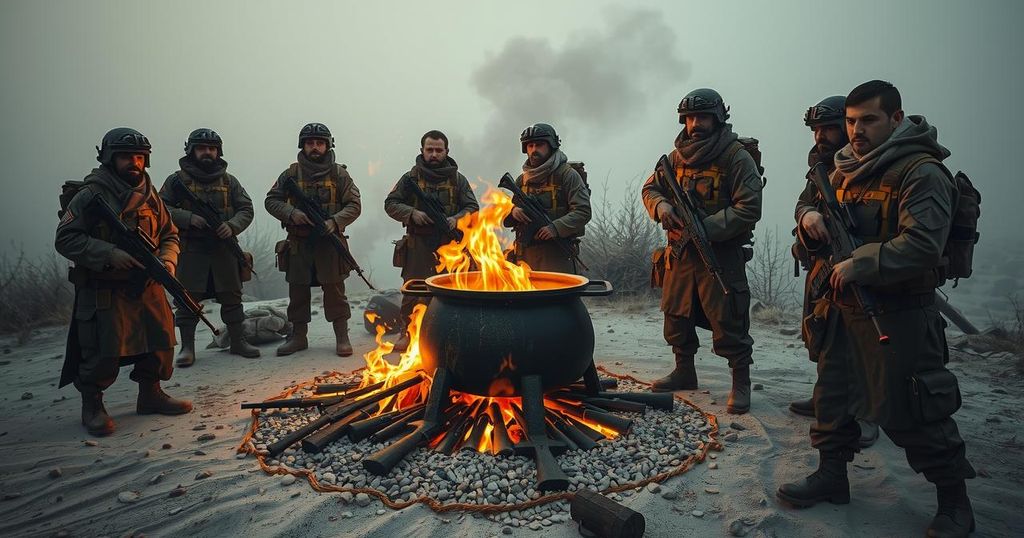What to Know About the Latest Effort to End Turkey’s 40-Year Kurdish Conflict
- 30 Kurdish fighters burned weapons in a symbolic disarmament effort in northern Iraq.
- Abdullah Ocalan, the PKK’s leader, urges disarmament for peace.
- Devlet Bahceli’s proposal for Ocalan’s parole marks a political shift.
- The PKK’s insurrection began in 1984, evolving from seeking independence to autonomy.
- Past peace efforts have all failed to produce lasting results, highlighting ongoing conflicts.
Ceremonial Disarmament Marks New Phase of Peace Efforts
A momentous event unfolded recently in northern Iraq as a group of 30 Kurdish fighters, donned in camouflage uniforms, conducted a ritual that symbolizes a significant step toward peace. This gathering saw the fighters, including a notable contingent of 15 women, ceremonially surrender their weapons by burning them in a large cauldron. This act is part of a broader initiative to resolve the Kurdish conflict, which has persisted for four decades between Turkey and Kurdish separatists, notably the Kurdistan Workers’ Party (PKK). This initiative gained momentum after Abdullah Ocalan, the group’s imprisoned leader, urged his followers to disarm and work towards a peaceful resolution in a recent video message. Thus, many see this as not just an isolated gesture but a potential turning point in what has been one of the longest insurgencies in the Middle East.
Understanding the Historical Context of the Conflict
The PKK has been entrenched in an armed struggle against Turkey since 1984, initially fighting for an independent Kurdish state but eventually shifting towards a push for cultural rights and autonomy for Kurds. The conflict has had devastating consequences, claiming the lives of tens of thousands. Internationally, the PKK is deemed a terrorist organization by Turkey, the United States, and the European Union, which complicates its position in diplomatic negotiations. Abdullah Ocalan, who founded the PKK back in 1978 and has been imprisoned since 1999, remains a significant figure despite his incarceration. He has become a symbol of Kurdish identity and the quest for rights, and his stature could sway the direction of these delicate negotiations.
Political Shifts and Emerging Challenges
The recent efforts for peace took a surprising turn after Devlet Bahceli, who is a staunch nationalist ally of President Erdogan, surprisingly suggested that Ocalan could receive parole if he pledges to renounce violence. This marks a striking change from Bahceli’s prior hardline stance against any compromises with Kurdish rights. Ocalan’s call, relayed through the pro-Kurdish People’s Equality and Democracy Party, has sparked cautious optimism among Kurds, although uncertainty still looms over what benefits they might receive. Although the PKK has announced a ceasefire and its intentions to disarm, the landscape remains fraught with risks as splinter factions could emerge and potential attacks may continue, which was highlighted by a recent deadly strike attributed to the PKK.
The Broader Implications of Regional Turmoil
Over the years, numerous attempts at peace have faltered; secret negotiations and ceasefires have preceded the current situation, yet none have resulted in the desired long-lasting solution. Previous initiatives to resolve the conflict, like the ones in 2013-2015, saw significant dialogues leading to temporary optimism, but ultimately collapsed amid renewed violence. In the last few years, Turkey’s response to the Kurdish movement has leaned towards repression, with thousands incarcerated, including former politicians like Selahattin Demirtas, signaling a chilling period for Kurdish political aspirations. Yet with current regional dynamics shifting—exacerbated by turmoil in Syria and ongoing conflicts—the latest peace effort might present an opportunity for a historical breakthrough or, conversely, a continuation of the cycle of violence.
Navigating a New Political Landscape
As political winds change in the Middle East, the ongoing reconciliation attempts between Turkey and the Kurdish community bring a complex set of challenges and potential. Analysts suggest that the PKK’s waning military power has led them to consider peace as an acceptable alternative, particularly against the backdrop of suffering from military setbacks. Nevertheless, speculations arise regarding the motivations behind this peace process, with some suggesting it may largely serve Erdogan’s interests in securing Kurdish support for constitutional changes that could extend his rule. The various parties, including Bahceli and other political leaders, appear to be traversing a delicate path that will determine not just Kurdish rights, but the future political landscape of Turkey as well.
The latest developments in the Turkish-Kurdish conflict signal a potentially transformative moment in a struggle that has shaped the region for decades. While the ceremonial disarmament of the PKK marks a hopeful first step, the intricacies of Kurdish rights remain unresolved and fraught with uncertainty. With fluctuating internal and regional dynamics, the path towards lasting peace is still laden with challenges ahead.




Post Comment